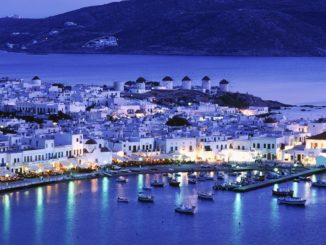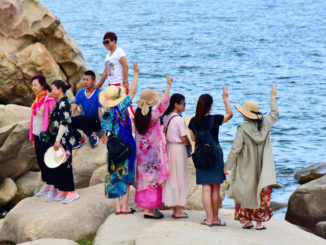 As Chinese tourists shun protest-hit Hong Kong, other Asian destinations are cashing in on the rush of travellers heading elsewhere, with Singapore coming up trumps by recording the highest monthly number of visitors from the mainland in over a decade.
As Chinese tourists shun protest-hit Hong Kong, other Asian destinations are cashing in on the rush of travellers heading elsewhere, with Singapore coming up trumps by recording the highest monthly number of visitors from the mainland in over a decade.
The Lion City’s tourism board said nearly 390,000 travellers from mainland China paid a visit in July – a hefty 46 per cent jump on the figure for June, when 265,998 arrived.
Industry experts said there were always more Chinese tourists heading abroad in the summer to take advantage of the school holidays.
According to Hong Kong authorities, tourist arrivals dipped abruptly in July by 4.8 per cent compared to the same month in the previous year.
The number of Chinese visitors fell 5.5 per cent to 4.16 million, down from the 4.4 million in July 2018.
Thailand and the Philippines also saw increases, with Chinese holidaymakers climbing 9.4 per cent in the Land of Smiles between June and July, and almost 30 per cent in the Philippines.
Chua Hak Bin, senior economist at Maybank Kim Eng Research, said Chinese tourist arrivals had recently been “very strong” in Thailand despite a strong local currency making the country more expensive.
The kingdom saw an 18 per cent rise in August year on year, while Vietnam’s number was 12.4 per cent. The Philippines meanwhile witnessed a huge year-on-year increase for August of 43.2 per cent.
“Most of Southeast Asia appears to be benefiting from the diversion of tourists from Hong Kong,” Chua said.
The surge across the region comes despite pressure on mainland wallets from the US-China trade war and a weakening Chinese currency, which had previously kept many would-be travellers at home.
For 21-year-old Wang Mengzhe, a Chinese student in London, choosing where to go on holiday this summer was as much about making a political statement as safety.
Wang, who visited Bangkok and Hua Hin last month, has decided to stay away from Hong Kong, which he usually frequents religiously every year.
“The mainland people don’t want to contribute to the Hong Kong economy in any way,” Wang said.
“There is a general sentiment in China that they want to leave Hong Kong dry. They don’t want to create any income for Hongkongers, as they see them as ungrateful.”
Travel industry experts cited several reasons for the growing number of Chinese opting for Southeast Asian countries.
Michael Chiam, a senior lecturer in tourism at Singapore’s Ngee Ann Polytechnic, said: “Geopolitical issues do not crop up with these countries. Chinese, to some extent, follow what their government says, and for countries that are not friendly to them, they will not visit.”
He said Hong Kong, Taiwan, Japan and Korea had long-running disputes with Beijing and were “not that popular”.
“From that angle, the ASEAN region is relatively safe for them. As far as sentiment is concerned, it is relatively positive,” Chiam added, referring to the 10-member Association of Southeast Asian Nations.
Alfred Wu, associate professor and assistant dean at the National University of Singapore’s Lee Kuan Yew School of Public Policy, said Singapore, Malaysia and Thailand had always been tourism hotspots for the Chinese, but the unrest in Hong Kong had strengthened their positions.
“The Chinese call them the Xin-Ma-Tai [using the first character in the Mandarin names of the three countries], and they are traditionally favourable destinations,” he said.
Wu, whose research focuses on China’s political economy, suggested Hong Kong had lost its appeal for the nation’s growing middle class looking for “high-end tourism”.
However, figures show mainland Chinese travellers have been swarming neighbouring Macau.
There was a 18.5 per cent spike in the number of mainlanders making their way to the casino hub in July compared to a year earlier, with the total for the month hitting just under 2.57 million.
Song Seng Wun, an economist at CIMB Private Banking, said: “They are not there just for the casinos. Macau has been doing a good job promoting integrated resorts and more wholesome family holidays.”
Song added that Chinese tourists and businesspeople would skip their Hong Kong trips if they felt it was not safe there, and cities such as Singapore would be the winners, even if they were pricey for the average mainland traveller.
Several major conferences and summits initially scheduled to take place in Hong Kong have either been postponed or moved in recent months.
The Global Wellness Summit, a health and beauty conference slated for mid-October, was relocated to the Lion City.
The Fairmont Singapore and Swissotel The Stamford have reported business groups checking into their hotels after opting to pass on planned visits to Hong Kong.
Added Song: “The more protracted and more violent [the protest movement] becomes, the less likely it is we are going to see arrivals in Hong Kong rebounding any time soon.”
The windfall for Southeast Asia would be considerable, analysts said.
“China is the single largest tourist source for most countries in our region … I believe it makes up about a quarter of all international visitor arrivals in Singapore, Thailand, South Korea and Japan,” said Sin Harng Luh, an associate professor for the School of Tourism Management at Guangzhou’s Sun Yat-sen University.
Sin believed many countries had been planning for a surge in Chinese tourists regardless of the protests in Hong Kong.
“Tourist expenditure from China and Chinese investments in tourism infrastructure in Southeast Asian countries contribute greatly to our economies,” she said.
These could help cushion the bump many in the region were feeling from the trade war between China and the United States, the world’s two largest economies.
But for Singapore, where tourism makes up only about 4 per cent of gross domestic product, Song said the boost would barely make a difference.
It would be more significant for economies such as Thailand, where the tourism industry accounts for about 10 per cent of GDP growth, he argued.
By Dewey Sim



